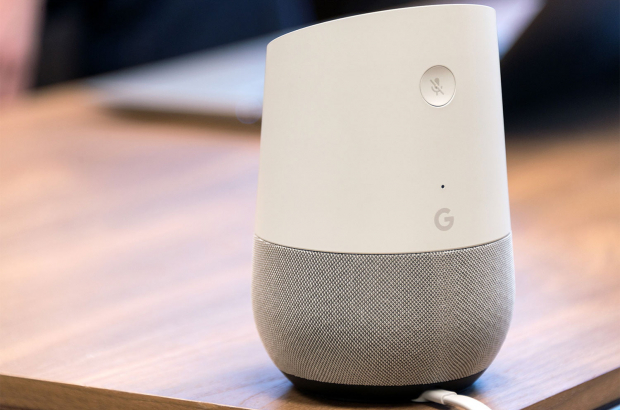- Daily & Weekly newsletters
- Buy & download The Bulletin
- Comment on our articles
Google Home and Assistant listening to private conversations
An investigative report by Belgian broadcaster VRT has revealed that Google employees are listening to people’s private exchanges through the Google Home device and the Google Assistant app on smartphones. The report aired on VRT News yesterday evening.
Google Home and Google Assistant are voice-activated response systems that work like an internet browser, but speak the results rather than show them on a screen. If you ask the device, for instance, who Charles Michel is, it will give you a verbal run-down on the Belgian politician.
People use Google Home to check the weather or traffic in the morning, or to give them the latest headlines. It proves a convenient tool when one is getting ready to go to work, for instance. You can even ask the device to tell you a joke or to call the nearest Delhaize.
VRT spoke to an anonymous employee in Belgium who works for a Google subcontractor. He came to the broadcaster himself out of concern for people’s privacy, following last month’s revelations that employees of retail giant Amazon were tasked with listening to users of its smart speakers.
Improving technology
His face was blurred out on camera as he described how Google, just like Amazon, trains some employees to listen to questions or commands that have been recorded after a user uses a voice command to activate the device.
Google does this to improve the devices’ responses. Employees around the world work in their own language to transcribe what the person has said and give other information about the voice – such as is it a man, woman or child. This way Google can make adjustments to the technology taking into account dialects and intonations in all languages.
While much of those fragments are not exactly private information – and Google does mention in its privacy policy that your commands to the devices can be recorded and stored – more disturbing are when the device records fragments of conversations not meant to be aimed at the device.
Not OK, Google
This happens when Google thinks it’s getting a demand for information but isn’t. Often brought into service with the voice command ‘OK Google,’ the app and Google Home device can sometimes mistake other words for ‘OK Google’ and start recording. It can even mistake someone else’s voice from a metre or two away as a command to start listening.
The local employee handed over 1,000 voice fragments to VRT, of which about 150 were such ‘accidental’ recordings. They included people singing, delivering messages from their car to spouses at home or kids fighting with each other.
While Google says that the employees do not know the identity of the fragments to which they are listening, VRT was able to track down several households just by listening to fragments – such as when they tell someone on the phone their address, and Google picks it up. Or even if they use the app to navigate them home via GPS.
Domestic violence
The employee said that Google records more fragments in language territories where it needs more work – like Flanders. “For the Flemish market, where the system is much less well trained because fewer transcriptions have been made,” he said, “it records things that are not purposely said to the device.”
VRT heard fragments with sensitive information, like calls to doctors, and even people who were having sex. “I remember one longer fragment where I was concerned about physical violence,” said the employee. “There was a female voice, and you could hear that she was clearly in distress. And then you realize these are people you are listening to, not just voices.”
Google, he said, doesn’t provide any guidelines for when employees hear sensitive information.
VRT asked Google for a response and received one immediately. “We work with language experts worldwide to improve language technology by making transcriptions of a small amount of audio recordings. This work is essential if we want to develop technologies that enables us to make products like the Google Assistant.”
Experts, however, are convinced that the recordings are in breach of EU privacy laws. “The European GDPR privacy legislation has two clear demands for the use of consumer data,” said federal privacy minister Philippe De Backer. “The consumer must provide explicit permission for the use of data and must also be fully aware of what that data is used for.”
Belgium’s Privacy Commission told VRT today that it would likely launch an investigation.















Comments
If you let Siri, Alexa, or Cortana into your home, don't complain about your "lack of privacy." You're doing this to yourself.
this is ANCIENT news...like from two years ago
@reddevil The news you're referring to was specifically about the Home Mini, not done purposely and fixed with a software update. This news is substantially different.